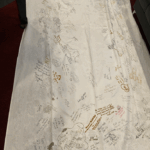The first thing I mothered was a turtle the size of a silver dollar pancake that I bought for 88 cents at Woolworth’s. The store clerk handed over Herman (I believe there was some legal requirement then that all turtles be named Herman) in a tiny Chinese takeout box, and his little claws scrabbled against the waxy interior all the way home in the family Dodge.
In a display of largesse, my mother financed a home for Herman, a clear, plastic, oval dish with a miniature staircase leading up to an island with a jaunty green-leaved plastic palm tree stuck in it. A little water in the bottom, Herman plopped atop the atoll, and my 7-year-old maternal instincts kicked right in.
I discovered that if I petted his nose, he jerked his head back into his shell like a collapsing telescope. If I held him upside down to count his yellow-and-green belly splotches, he peed in my hand. If I dropped turtle food flakes, which smelled dreadful, on the top of his head, he wore them for days. One morning, Herman was inert. I let him languish for half a week, and then, solemnly humming Tantum Ergo Sacramentum, I processed to the sandbox and buried him an inch deep. The next morning, he roused himself, dug his way out, and headed for the tall grass, his wee footprints bordering the track of a thin, dragging tail.
What they don’t tell you about mothering is how often you get it wrong.
I went on to nurture, with varying degrees of success, a collection of teeny-weeny toads; a terrier, a sheepdog, and a Newfoundland; several much-too-expensive orchids of obscure varieties, and three human beings. The toads were the pickiest eaters, the orchids most given to fungus, and the human beings by far the most intriguing. When I was trying to teach them something, suddenly I learned something, instead. Despite having won debating trophies, I lost every argument I ever had with a 6-year-old — those creatures are born defense attorneys. It is not possible to make a 15-yearold happy on a family vacation — I have tried and failed, three times over. There is no scientifically accurate answer to most questions that begin with “Why?” And despite all my naive promises to myself, I lied about Santa, the Easter Bunny, the Tooth Fairy, the way democracy works, and the specific details of how I behaved in college.
As the mother, I could run things just the way I wanted to when I was 12. I could declare the living room a gymnasium, pronounce chocolate an acceptable food group, and attempt to raise Democrats. I could set achievement standards at accessible levels — please, no chainsaw murderers — and force my progeny to memorize Dorothy Parker quotes.
Well, those are the glamorous things I could have done, but I actually did none of them. Mostly, I was a single mother, struggling to bring home the bacon and keep us in macaroni and M&Ms — food items that I threatened to combine into a single hot dish when the fighting over video games escalated into karate performed on the sofa. My children were admirably tolerant of my failure to become wealthy during their formative years. Once, a pair of stunningly expensive sneakers so bankrupted the budget that we set them on the dining-room table as a centerpiece for a week before Christopher was finally allowed to wear them to school. The afternoon when I learned the price of the hockey goalie pads Ian wanted, I had to hide in the bathroom and hyperventilate into a popcorn box. And the day Gretchen converted chocolate pudding and milk into papier-mâché paste that stucco-ed the living room walls shall go unremarked upon. But they lived, made it to the final level of Zelda, graduated college, and are quite lovely people. And not one of them is a chainsaw murderer. Yet.
What they don’t tell you about mothering is that once you are good and thoroughly in love with that toddler, fairies come in the night and take her away and bring you a preschooler, instead. And then you fall in love with the preschooler, and poof! She’s gone and you’ve got yourself a gangly child. And then that kiddo disappears and you’re presented with a teenager, and people start lighting candles and saying novenas for you. Despite 13-through-17, each age was delightful and I mourned its passing. Though my youngest is fully grown, I swear I wouldn’t be startled to open a bedroom door and find a 3-year-old in there, grinding Silly Putty and saltines into the carpet. Though they are long past, through some magic peculiar to parenthood, those ages of infancy and childhood seem alive and real to me now, and there’s something to be mourned there.
What they also don’t tell you is how despicably gleeful the little darlings are as they take off on their own, how heedlessly they leave behind the island of serenity and plastic shade you lovingly provided, and how eagerly they set out for the tall grass just outside the sandbox.
You can’t plan for motherhood (or fatherhood), as it turns out, because it never turns out as planned. But it often does turn out just fine, whether or not you knew what the heck you were doing. This is largely because children are born resilient and loving you, and possess the good sense to stick to their guns on those two points, bless their knees, even if you do get it wrong, sometimes or often. Which is something, come to think of it, that they really should tell you. At least every Mother’s Day.
This article first appeared in Milwaukee Magazine
Photo Credit: Milwaukee Country Board



